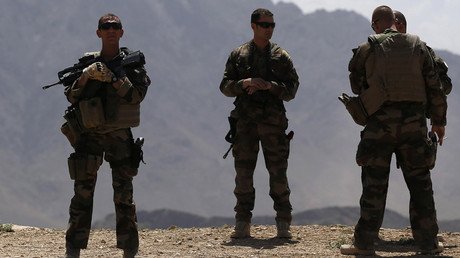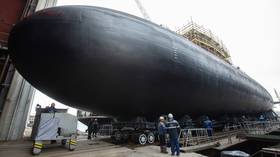US & NATO will always share blame for Libya’s re-descent into chaos
Recent developments in Libya have put the focal point of the international media back on the war-torn country. As we will see, there are many crucial omissions from the mainstream assessment of Libya’s descent into further chaos.
Libya is back in the news again. At the beginning of this week, a warplane attacked Tripoli’s only functioning civilian airport, Mitiga airport. The airstrike was allegedly delivered by forces loyal to Libyan warlord Khalifa Haftar, the Libyan National Army (LNA). The timing of the attack appears to have coincided with UN Secretary-General Antonio Guterres’ visit to the city, who eventually left Libya “with a heavy heart and deeply concerned.”
Between 2,800 and 3,400 people have fled the fighting around Tripoli so far, with at least 47 reportedly dead and over 180 others injured, including both civilians and pro-government (GNA) fighters.
Also on rt.com Only functioning airport in Libya's Tripoli hit by air raid - reportsOriginally, UN-backed talks were scheduled for 14-16 April this year, but this recent fighting has called all of that into question. So much so, that US forces have been withdrawn temporarily due to “security conditions on the ground.” Announcing that US troops will be withdrawing from a North African nation temporarily barely seems to attract even the most basic questions from the mainstream media, including the much-needed “why are US troops still in Libya?”
Still, Washington’s withdrawal from Libya may lead the way for other players to take control. As it stands, Libya has hardly been a priority of the Trump administration, who appears to have given an unofficial green light for other players to attempt to clean up the mess.
Interestingly, if Libya were talked about more openly and not in the reactionary way employed by the mainstream media, this fighting would have been foreseen a long time ago and ample warning would have been given. In early March, Middle East Monitor (MEMO) reported that during January and February of this year, Haftar had managed to take control of two-thirds of Libya with an eye for taking Tripoli, the country’s capital. By that stage, he had already seized most of Libya’s oil fields and major population centers. By early 2017, Haftar had already emerged as a major leader in eastern Libya, giving him control of about 60 percent of Libya’s oil supply.
READ MORE: Oil prices spike to 5-month high as military conflict in Libya escalates
According to MEMO, the pro-Haftar forces were greeted by cheerful locals in almost every village and town they advanced into (though this is not necessarily a claim we should accept outright). MEMO’s thesis was essentially that the changing dynamics in the local politics of Libya could entail that Haftar would look to take Tripoli in the near future, but that it was unlikely to happen any time soon. Following this, the last major area to conquer that would likely put up any meaningful resistance is Misrata, 300 km away from Tripoli.
Instead of having an open discussion about the true nature of the situation in Libya throughout 2019, what we get from the media is a sort of “Libya is descending into chaos once again” knee-jerk reaction, followed by the usual “America can stop it” type pro-imperialist nonsense. When we aren’t receiving this dishonest attempt to reassert American hegemony, we have to swallow the most ambitious of propagandised gibberish from the Guardian such as:
The outcome could decide whether the country remains on a lengthy, UN-led path to a form of democracy that reunites the country’s long-divided institutions, or instead falls under a form of military rule similar to that in Egypt.
Which leads us to the real reason that the US will most likely want to re-involve itself into the North African nation: Russia.
In the wake of the recent clashes, Moscow vowed to use “all available means” to broker peace in the war-torn country, urging all sides to the violence “to avoid any actions that could provoke bloodshed and the death of civilians.”
While the US and other notable powers have blamed the fighting squarely on Haftar and his forces, Russia appears to have disagreed, blocking a security council statement initiated by the UK to condemn Haftar. While this will only further give the United States reason to cringe over its future grip over a North African nation abundant in oil, the hidden truth is that US once-upon-a-time backed Haftar to overthrow Gaddafi prior to his death in 2011. In fact, he was granted US citizenship having spent about two decades living in Langley (I am sure the proximity of his residence to the CIA headquarters is a sheer coincidence). Reportedly, Haftar even allowed the CIA to establish a base in the eastern city of Benghazi in the area under his control.
While the US and Russia are likely to be the two main powers discussed in respect of this recent fighting and the international response to these clashes, there are some other notable players who are not receiving the same amount of airtime they deserve. Don’t expect it to be headline news, but just before the offensive was launched Haftar had been in Saudi Arabia where he had met with King Salman. It turns out that Haftar’s forces sympathize with the same, radical Salafist strain of Islam that the Saudi Kingdom exports to the rest of the world like a commodity.
He also allegedly receives support from Egypt, the United Arab Emirates (UAE) and even France, who has quietly been carrying out air strikes on Haftar’s opponents (Chadian opposition fighters). Not only is France one of the major causes for the chaos that engulfed Libya in 2011 (it was, after all, a French Rafale jet that struck Muammar Gaddafi’s fleeing motorcade in Sirte, leading to his brutal murder) but it is still to this day, behind-the-scenes, continuing a meddling, interfering policy in Libya that sees clandestine operatives, advisers and special forces to assist Haftar’s aims. This is despite Haftar’s long list of alleged crimes. That being said, France still denies that it had any prior warning of the recent advancement by the LNA.
US foreign policy seems to follow this curious, ludicrous and frustrating cycle of violence and the corporate media continue to act clueless. The pattern seems to go something like this. One, the US backs a certain group, groups, or a dictator of sorts to act as its proxy army against a common enemy. Two, once said enemy has been overthrown, that proxy will either take up the reins or continue to wreak havoc on the country, or both. When that group has outlived its usefulness, the group’s ties to other distasteful foes, their crimes against humanity, or any associated allegation is brought out into the open and a demonization process begins which will eventually lead to another call for the US to intervene. The fact that the US intervened the first time around and singlehandedly contributed to the chaos is hidden from plain sight by the media or is just outright ignored.
“Why is Libya so lawless?” The BBC once asked. We all know why, you just won’t report it accurately enough.
Under Gaddafi, Libya had the highest standard of living out of any country in Africa up until he was ousted by US-NATO backed forces. Its healthcare system was once the “envy of the region.” Following the removal of Gaddafi, Libya is the envy of nothing and no one, except for maniacal jihadists who have capitalized on the death and destruction left in the wake of the 2011 war.
READ MORE: Expected bloodbath in Tripoli an outcome of ill-advised NATO toppling of Gaddafi, historian tells RT
The empowerment of jihadists in Libya was not just an unforeseen consequence of NATO intervention, nor was it because of the failure of NATO powers to help rebuild a stronger country. The presence of jihadist elements in order to overthrow Gaddafi was a specific ploy utilized by NATO countries who even oversaw their movements into the country so they could topple the Libyan leader. In early 2011, a Libyan rebel commander admitted his fighters included jihadists who fought against allied troops in Iraq. These fighters then fought under the banner of al-Qaeda in Iraq (AQI), which only became established as an entity after the US invaded Iraq in 2003 in the first place. (AQI then became known as ISIS).
I could go on and on about this topic. Suffice it to say, any mainstream media op-ed calling on the US, or any Western power, to do more in Libya and to cease being “ambivalent” is a fraudulent piece of non-history and should not be treated as a credible geopolitical opinion.
Washington has done plenty in Libya and its surrounding region for decades. As Libyan political advisor Mohamed Buisier once said: “The history of Libya is the history of the foreign powers who ruled Libya.”
Like this story? Share it with a friend!
Subscribe to RT newsletter to get stories the mainstream media won’t tell you.
The statements, views and opinions expressed in this column are solely those of the author and do not necessarily represent those of RT.















